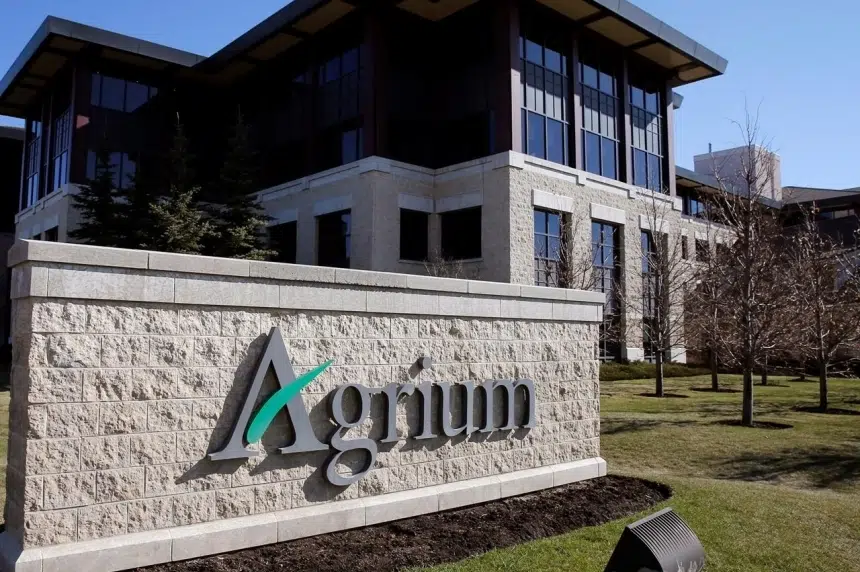CALGARY — Potash Corp. of Saskatchewan and Agrium have agreed to merge in a deal that would create a dominant player in the global agricultural industry worth an estimated US$36 billion.
The pact announced Monday brings together Saskatoon-based PotashCorp’s huge fertilizer mining operations with Calgary-based Agrium’s extensive global direct-to-farmer retail network, to create what they say will be the largest crop nutrient company in the world with close to 20,000 employees operating in 18 countries.
“We’re putting together the largest fertilizer producer with the world’s largest ag retailer, so the industrial logic in my eyes is really quite solid,” said Agrium CEO Chuck Magro, who will take on the same role in the combined company.
The combination of such big players in agriculture, however, has farmers and politicians concerned about a lack of competition at the expense of producers.
“It’s just one less competitor out there,” said Norm Hall, president of the Agricultural Producers Association of Saskatchewan.
“We’re seeing it across the board whether it’s in the fertilizer business, the chemical business, the grain buyers… the consolidation continues. They call it the greater good, but it’s the greater good of the shareholders, not necessarily the producers,” said Hall.
The Agrium-PotashCorp deal is just the latest in a wave of major mergers or acquisitions that affect farmers, including DuPont and Dow Chemical Co., and Bayer AG and Monsanto Co.
But PotashCorp CEO Jochen Tilk said the US$500 million in annual savings the combined company expects to make will be good for their customers.
“I think this is very good for the farmers and our customers, because if we can lower our costs in a highly competitive environment, then the farmers and our customers can only benefit,” said Tilk, who will serve as executive chairman of the merged company.
The Saskatchewan NDP has also raised concerns about potential job cuts in the province, but Magro says layoffs are a small component of the cost savings, with much of it coming from boosting efficiencies across the operations.
“It’s not about shutting down operations, it’s about lowering costs of production,” said Magro. “The synergies and value creation are all about optimization of production and distribution and procurement, and then integrating some of that into the retail business.”
Potash companies have already made moves this year to cut costs and production, with PotashCorp shutting its recently opened Picadilly mine in New Brunswick in January and temporarily closing some Saskatchewan mines. U.S.-based Mosaic Co. has closed its potash mine near Colonsay, Sask., until market conditions improve.
Neil Fleishman, a senior industry consultant for Green Markets, said the oversupply in the potash market was one of the main reasons for the agreement. He said by combining, they can take advantage of cost savings.
He added while there’s no complete certainty, those savings likely won’t include big job cuts.
“You may see a little bit of streamlining,” he said. “But I think most of the major announcements… have probably already taken place.”
Premier Brad Wall said Monday his government is closely monitoring the merger. He said they’ve asked the companies about jobs, and there’s no indication there will be cuts.
“We have asked the question directly and production is not listed, is not mentioned as the source for those savings but it is something we are going to watch for,” Wall said.
He added he doesn’t believe farmers will be negatively impacted by the merger.
“PotashCorp has never been involved on the retail side as you know, so that’s just been Agrium, so we are not losing a retailer on the fertilizer side for farmers as a result of this merger.”
The premier’s analysis of the retail side may be correct. According to Fleishman, the merger will reduce Agrium’s need to buy third-party potash for retail distribution. This would allow them to cut costs in the distribution chain.
News of the deal comes as the fertilizer industry struggles with a steep drop in prices in recent years following a ramp-up of production and the breakup of a Russia-Belarus potash trading cartel in 2013.
PotashCorp reported an averaged realized price in the second quarter of US$154 per tonne compared with US$273 per tonne a year ago, and well off the 2008 peak of around US$900 a tonne.
Under the agreement, PotashCorp (TSX:POT) shareholders would receive 0.4 of a share of the new company for each common share of PotashCorp they own, while Agrium shareholders would receive 2.23 shares for each Agrium share (TSX:AGU) they own.
PotashCorp shareholders would own roughly 52 per cent of the yet-to-be-named company, while Agrium shareholders would own 48 per cent on a fully diluted basis.
The industry has looked for consolidation in the past, with PotashCorp pushing for a US$8.7-billion takeover of K+S Group last year that was rebuffed by the German fertilizer group.
PotashCorp itself was the target of a US$38.6-billion takeover bid by BHP Billiton in 2010, but the Canadian government ultimately blocked the offer as not having enough net benefit for Canada.
Analysts expect the deal to face less scrutiny than the BHP proposal because both companies are Canadian, but it will still have to go through regulatory and Competition Bureau approvals.
The Saskatchewan government formed PotashCorp in 1975 as a Crown corporation before it was privatized in 1989. Agrium was founded in 1931 as part of Cominco and became a publicly traded company in 1993.
With files from CKOM News and CJME Senior Reporter Sarah Mills
Follow @ibickis on Twitter.
Ian Bickis, The Canadian Press
©2016 The Canadian Press







